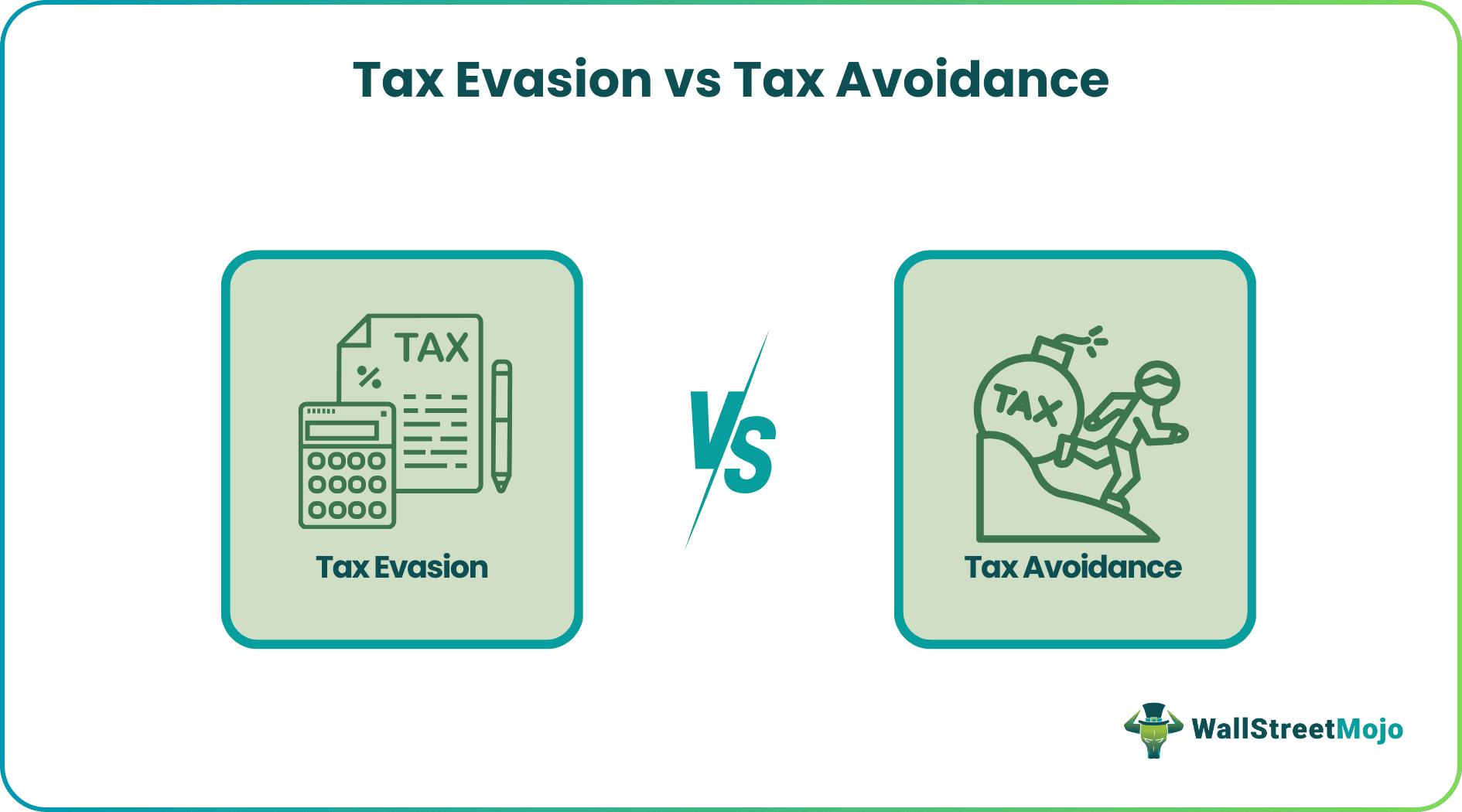Table Of Contents
Difference Between Tax Evasion and Tax Avoidance
Tax Evasion refers to the adoption of illegal methods for reducing the liability of payment of taxes, such as manipulation of business accounts, understating of incomes or overstating of expenses, etc., whereas, Tax Avoidance is the legal way to reduce the tax liability by following the methods that are allowed in the income tax laws of the country such as taking permissible deductions, etc.
When one consults a tax attorney and seeks legal advice to avoid an assessee's tax is what we call tax avoidance, whereas one using illegal methods to avoid taxes can be termed tax evasion. So, you can see that both Evasion and Tax Avoidance reduce taxes.

This article provides a clear difference between tax evasion and tax avoidance.
Tax Evasion vs. Tax Avoidance Infographics
Here we provide you with the top 4 differences in Tax Evasion vs. Tax Avoidance.

Key Differences
The key differences are as follows –
- The primary key difference in tax planning is within the four pillars of the law, and if a person is saving the tax by using the methods made available by its local law, it is termed to be tax planning, but if not, then its tax evasion.
- While the assessee can get punishment, which may not be bailable for tax evasion, there is no such punishment for tax avoidance as one takes legal methods.
- Tax avoidance can be termed an ethical way of reducing taxes, and tax evasion can be called an unethical way of reducing the tax burden.
- Falsifying accounts, manipulating accounts, overstating expenses, understating income, and conducting black market transactions are examples of tax evasion.
- Tax avoidance and planning are permissible, whereas evasion is not permissible under local laws.
Tax Evasion vs. Avoidance Comparative Table
| Basis | Tax Evasion | Tax Avoidance |
|---|---|---|
| 1. Basic Definition | It can be termed as a crime in which a business entity or individual intentionally hides or underpays their particular amount of income to save a massive amount of taxes. | Tax Avoidance in a legal manner is the way of reducing the assessee's taxes through the local government's medium. |
| 2. Ways to conduct | It is undertaken by using unfair means. | It is undertaken by taking advantage of the loopholes in the local laws. |
| 3. Repercussions | As it is performed through an illegal way of paying taxes, and therefore the defaulter may be liable for punishment. | It is not performed through wrongful intention but only after studying and complying with the law's provision. |
| 4. Examples | Hiding your true income by understating the same. Overstating expenses in your return. Using offshore accounts to hide interest income; Keeping transactions unrecorded. | Using a legal way of avoiding tax by investing in certain schemes provided by local laws, E.g., Opening a Public Provident Fund (PPF) account and investing in the same regularly to reduce taxes. They are creating other legal entities and splitting revenue between them to be eligible for tax slab benefits. |
Conclusion
So, every individual has their ethics and way of conducting and acting to circumstances. Choosing the right way matters the most.
- Tax avoidance is using loopholes in tax law, but again at the end of the day, that should not be advisable, although it’s 100% legal, as that defeats the main purpose and the intent of bringing in the law by the government. Hence, we witness almost every year that the government tries to bring amendments in its annual budget to avoid and reduce all the loopholes to misunderstanding and misuse of the law, which is done legally.
- Further, to catch the tax evaders, the government keeps a vigilant eye on almost all the filings and transactions conducted by the assessee. They try to reconcile the same received from different sources. E.g., Banks report all the interest income and taxes deducted by them to the government; local authority reports all the real estate property transactions conducted during the financial year; also government keeps on building up relationships with other countries by signing a treaty where both the countries agree to share the details and all the income of their local residence earned in that country which helps in reducing tax evasion.
- Now the question arises how do we avoid conflict? So, the best way to get rid of being charged with tax evasion is to know all the employment and income tax laws. For example, knowing all the deductions considered legal and the recordkeeping requirements for deductions are the big factor in avoiding an audit. For employers, it would be knowing the payroll tax payment and reporting requirements, which will help keep them out of trouble.
- Both are meant to reduce the liability of assessee tax ultimately, but what makes the difference is that the former is justified in the eyes of the law as it does not make any offense or break any local law. If we talk about the latter, it is 100% unjustified as it is a fraudulent activity because it involves those acts forbidden by the local law; hence they are punishable. However, it appears biased as the honest taxpayers' assessees are not fools as they can also decide to postpone the unnecessary tax.
